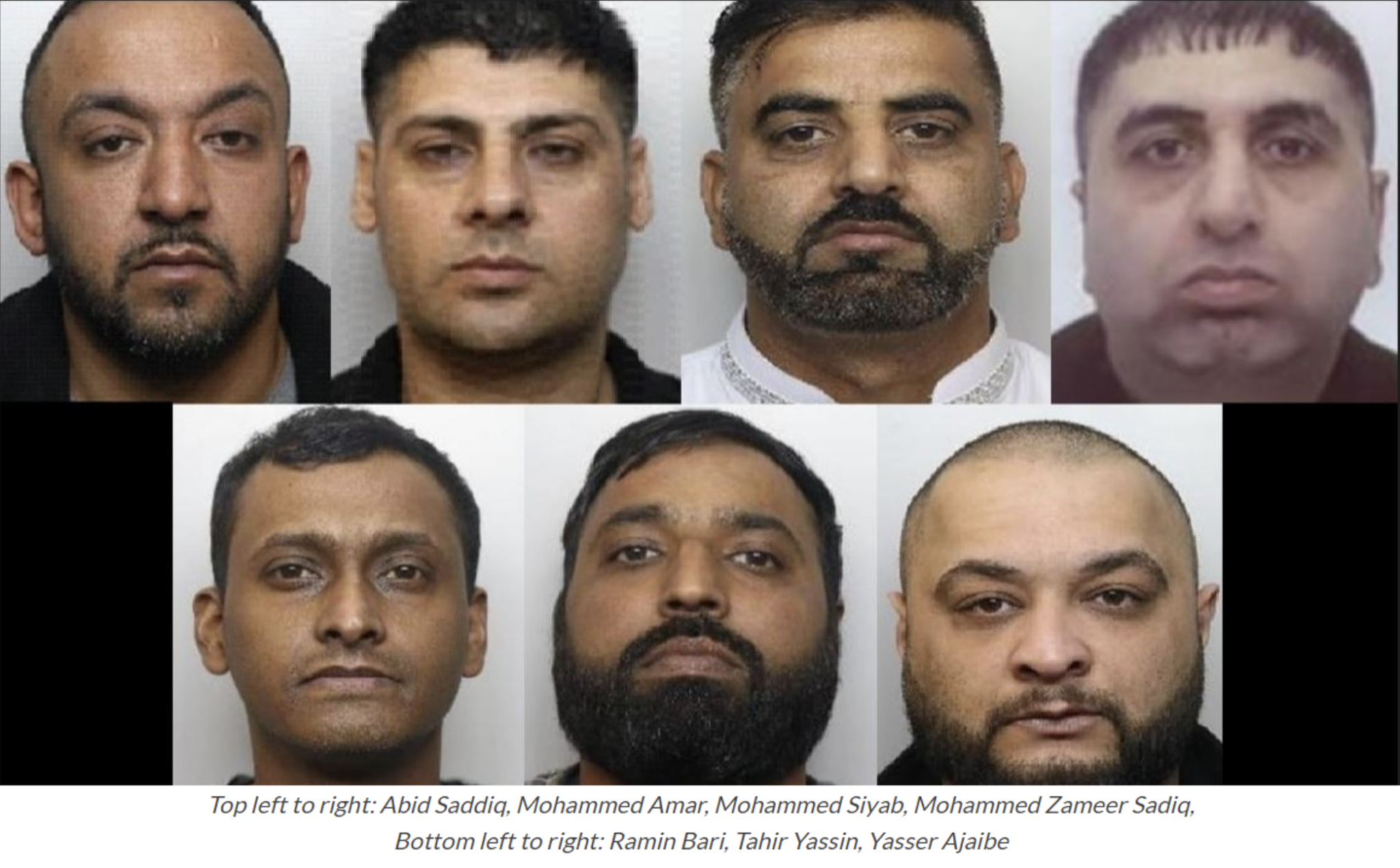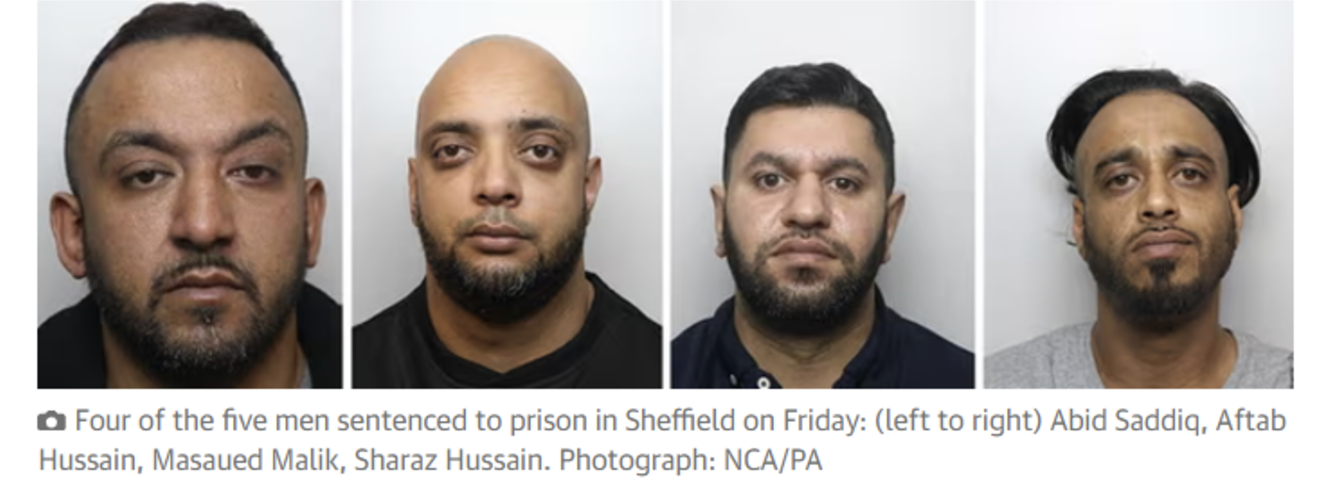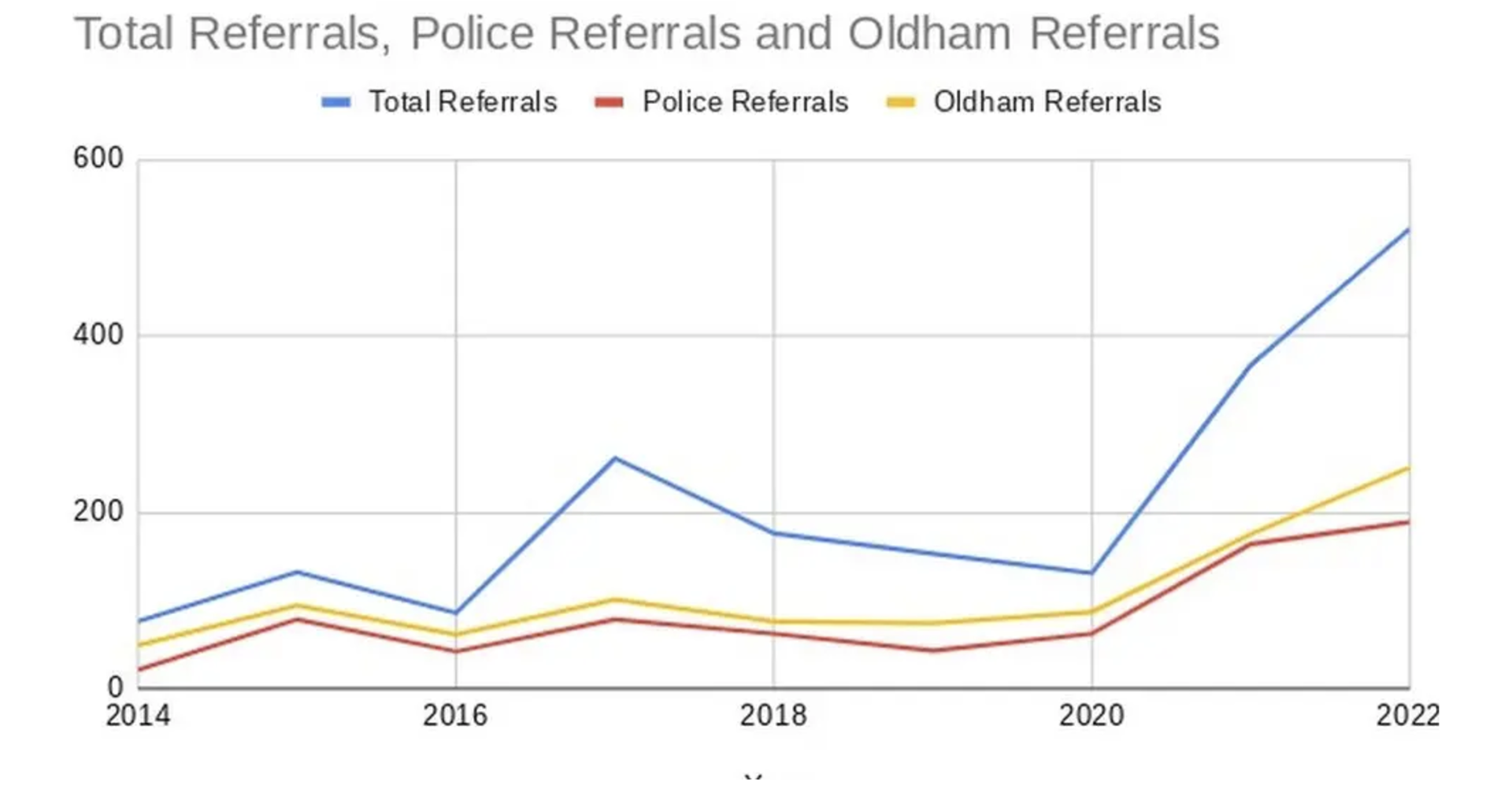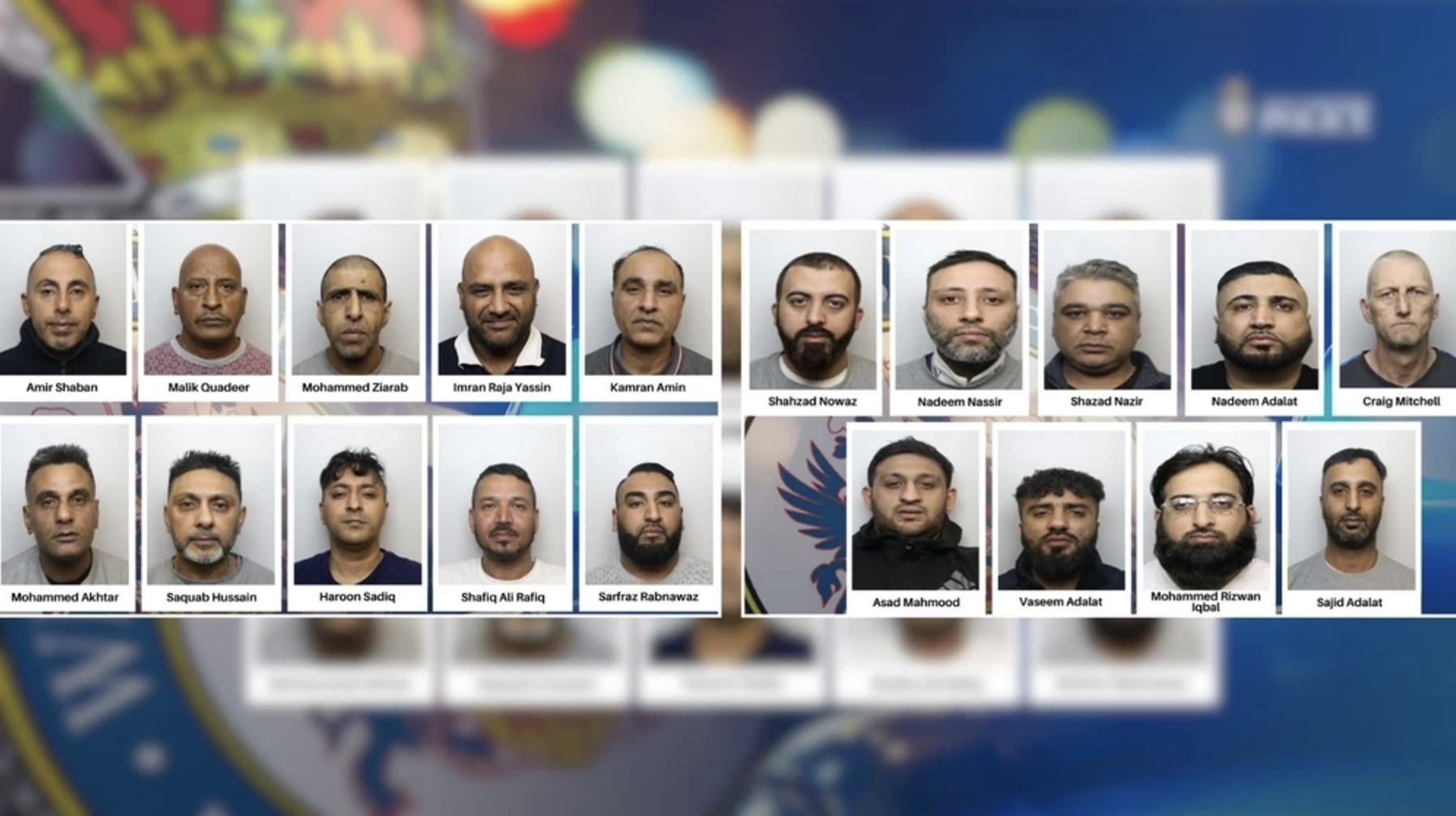When 1,200 men, women, and children were murdered, and 254 taken hostage by Hamas on October 7th, Israel vowed not to stop fighting until the terrorist group was vanquished. Citizens enlisted in the IDF to avenge the innocent victims of the Rei’im music festival massacre. The Israeli government has given them all the moral and military support they need to end the threat once and for all.
This unreserved defence of a people by their government after horrific crimes makes what has happened in Britain all the more sickening. For decades, thousands of children have been raped by predominantly Pakistani Muslim predators. To this day, establishment media remain silent about these ethnic and religiously motivated grooming gangs. Unlike in Israel, the UK has no authority willing to defend and avenge these girls’ stolen innocence. Worse still, the British government continues to endanger English girls through its open-doors immigration policy.
In September, seven men were sentenced to over a hundred years in prison for child sex offences between April 2003 and April 2008, in Rotherham, South Yorkshire. All denied the charges, but were convicted on 25 counts for a combined total of 106 years.
Enjoy independent, ad-free journalism - delivered to your inbox each week

Mohammed Amar was convicted of two counts of indecent assault, and sentenced to 16 years imprisonment, with two years extended licence. Yasser Ajaib was convicted of one count of indecent assault, and sentenced to 6 years imprisonment, with 12 months extended licence. Ramin Bari was convicted of four counts of rape, and sentenced to 9 years imprisonment. Mohammed Zameer Sadiq was convicted of one count of rape and one count of sexual intercourse with a girl under 13, and sentenced to 15 years imprisonment with 12 months extended licence. Saddiq is already serving a 20-year prison sentence after being convicted in 2019 of sexual offences following a separate investigation by Operation Stovewood — the National Crime Agency’s investigation into child sexual abuse in Rotherham. Mohammed Siyab was convicted of two counts of rape, one count of sexual intercourse with a girl under 13, and one count of trafficking, and sentenced to 25 years imprisonment with 12 months on licence. Presiding Justice Slater described Siyab as a “persistent and cruel sexual offender”; a description relayed to Siyab in Urdu, via a court-appointed, taxpayer-funded translator.
Tahir Yasin was convicted of eight counts of rape and sentenced to 13 years imprisonment. Confusingly, Justice Slater characterised Yasin as a “sexual opportunist rather than a predator”, despite Yasin raping a child. On Abid Saddiq, however, Slater was clearer: describing him as a “cunning and determined sexual predator” when he previously sentenced him for rape and indecent assault in a separate trial in 2019. In September, Saddiq was convicted of three counts of rape and one of indecent assault, and sentenced to 24 years imprisonment with a further extended 12 months licence.
In the 2019 trial, five men were sentenced to a total of 63 years. Aftab Hussain was sentenced to 24 years; Masaued Malik sentenced to five years; Sharaz Hussain sentenced to four years; and another man, who remained unnamed for legal reasons, was sentenced to 10 years. In September, Sharaz Hussain was extradited from Bulgaria to serve his sentence. In October, Aftab Hussain was convicted of another rape of a 15-year-old child in Rotherham, and sentenced to another eight years. Slater condemned the local authorities in Rotherham as at best “totally ineffectual” and at worst “wholly indifferent” to the epidemic of child sexual exploitation, in which over 1,500 of the town’s residents are estimated to have been victims.

Slater’s criticisms continue to resonate. Two women, who were cross-examined in the trial, were abused while in the foster care system. This is a common story among grooming gang victims: as the Alexis Jay OBE report stated, children in care were nearly four times as likely to have experienced child sexual abuse. One harrowing example was recalled by Tavistock whistleblower Dr. Kirsty Entwistle, in Hannah Barnes’ Time To Think:
Entwistle’s first job after graduating with her first degree was in a private children’s home in Rochdale. […] Soon after starting the job, a 12-year-old girl arrived at the home. She’d been in a secure unit beforehand, because she was running away all the time. Not long after she’d arrived in Rochdale, the same thing happened. […]
This young girl was being groomed. When she went missing, she was having sex with grown men. As soon as she left the home, there would be ‘some predatory man’ waiting in a car to pick her up. Kirsty Entwistle, barely an adult herself, was her key worker. ‘And I remember saying, “How do you feel after you’ve had sex with these men?” and she turned around and she just said, “I want to kill them.”’ Entwistle knew the girl needed help. But CAMHS wouldn’t be flexible when she wouldn’t turn up for appointments. And the police spoke about the girl with contempt. ‘Nobody helped us,’ Entwistle reflects sadly. […]
Entwistle’s job was ‘to stand in front of the door’, and stop that happening. She would be kicked, punched, screamed at and spat at in the process. Sometimes, she says, something has happened to children ‘that makes them want something so badly that is harmful to them’.
In September’s trial, the women explained their abusers collected girls from children’s homes across Rotherham — implicating the social workers in their dereliction of safeguarding duties. The girls were driven to the perpetrators’ homes, and locked inside. Others were abused in public places: a cemetery, a supermarket car-park, and behind a nursery. In one woman’s witness statement, she explained that she was first abused at age 11, forced to undergo a virginity test before being raped in a primary school playground. She stated that five of the seven men “started to pass me around as if I was a fresh piece of meat, man to man, city to city” — alluding to a broader trafficking network operating across the UK.
Addressing all seven men, the woman said,
“I don’t want to give you too much of my time, you’ve already had all of my childhood and the majority of my adulthood. […]
“Was I groomed or was I slag like they said I was? For years, I believed I was the slag. I was just a child, not a slag, nor was I a problem child. I was vulnerable and screaming for help.
“For years I’ve suffered and still do with flash backs, or I’ll get a whiff of one of my abusers’ smells and sometimes I still hear your laughs as you raped me. I wake up screaming from nightmares, even when I’m highly medicated this still happens.” […]
“You took my childhood, my innocence, my freedom, my family. I was forced into children’s homes because of what you did to me.
“Those homes didn’t protect me as they should have, in fact it made it even easier for you to take me. I was 12, yet it was okay for you to carrying on abusing me.” […]
“By the time I was 16, I had been abused by over 150 men. My education became nonexistent. I was violent and angry with the world. […]
“You ruined my life but I won’t let you ruin my future. I’m a fighter and a survivor. I’m thriving and fighting. You can’t and won’t ever take anything from me again.” […]
“22 years ago, you first started grooming me, and 10 years ago I started my justice fight.
“You stole my childhood, now I’m taking your freedom, I am your karma.”
A second witness’s impact statement, delivered by a prosecuting barrister, said
“All of you came into my life when I was at my most vulnerable, you all made me feel wanted, loved and part of something, something I craved. Life started to feel good, I felt as if I belonged, I was made to feel like I was pretty, like I was a somebody.
“What I did not realise, as a vulnerable child, was that you all had ulterior motives, you all befriended me for reasons it would take me years to understand. […]
“In the coming years I hope you feel as lonely, frightened and isolated as I have felt. You violated and humiliated me when I was a vulnerable child, now it’s your turn to feel as I did.”
However, controversy arose when the first victim’s statement was censored by Judge Slater, after she requested two of the seven be deported back to Pakistan. The original statement concluded,
“I’d like to request that after sentencing and upon Rudy [Mohammed Amar] and Showabe’s [Mohammed Siyab] release, that they should be deported back to Pakistan as this is where they originated from and came here to exploit children. Thank you.”
Justifying the censorship, Barrister Matthew Bean said “Whether they [the abusers] remain in this country or not” is up to the Home Office, regardless of what “the victim should say one way or another”. Under the UK Borders Act (2007), any foreign national “sentenced to a period of imprisonment of at least 12 months” is subject to automatic deportation. Yet, to this day, none of the men convicted for child sexual exploitation in Rotherham have been deported back to their nation of origin.
Due to an administrative error, both Mohammed Siyab and Abid Saddiq were resentenced, and had three years and one year removed from their prison stints respectively. They were made ineligible for automatic release, once two-thirds of their sentence is completed; however, parole boards have been criticised for conducting lenient, closed-doors hearings in recent years, so the offenders could be let out before serving their full terms. At the resentencing, one victim told GB News that relatives of the paedophiles were “dead eyeing” her in court, and instructed another relative to “slap the b***h” — causing National Crime Agency officers and court security to intervene. The victim said, “Siyab and Saddiq were cruel and appalling rapists, they stole my childhood. Their relatives should have some shame but instead, they are trying to fight with me at court.”
The convicted paedophiles’ families attended the trials, and waved to them as they entered the court. Peters notes that “family members were seen shaking their heads and crying as the sentence was delivered”. After Mohammed Siyab was sentenced, one of his daughters cried out “I love you dad” as he was led out of the dock. This may shock those of us who believe justice must be meted out impartially, without preference for family, clan, race, or religious creed. However, as Sheikh Ibrahim Mogra, an imam who joined Together Against Grooming in 2013, told the BBC: “People were troubled by us reading the sermon and one man asked me how he could stop it being read.”
There has been a culture of cover up within Muslim enclaves in Britain concerning child sexual exploitation. Some knew their brothers, fathers, friends, and cousins participated in grooming gangs, and said nothing, for fear of bringing collective shame upon the Muslim community. The Muslim Women’s Network complained that too little attention was paid to Muslim girls also being abused by Pakistani gangs — but failed to point the finger at the shame culture which pervades Muslim communities. A culture of shame encourages silence, because the family and clan are punished collectively for the actions of one or many members. Mohammed Shafiq, whose three cousins were jailed as part of the Rotherham grooming gang trials, explained that “the crimes of the Hussain brothers represent a stain on the Pakistani community that can never truly be scrubbed away” — and that, for this reason, “some British Pakistanis have deliberately buried their heads in the sand [and] see any of us who try to tackle this problem as siding with the white ‘enemy’”.
Some Muslims, such as Mohammed Shafiq, spoke out. In 2016, Shafiq said:
“The sad reality is that in the case of on-street gang grooming, there is an over-representation of Pakistani men.
“Until British Pakistanis accept that this is a problem for our community we will not be able to eradicate this evil. Burying our head in the sand as the usual response is not good enough.”
By the time I was 16, I had been abused by over 150 men. My education became nonexistent. I was violent and angry with the world. […]
Others abetted, or were merely indifferent, to white English girls being victimised because they are Kafir — non-believers. Equal moral consideration is not applied to those outside the Ummah. Worse still, some looked to Islamic scripture to justify their crimes. Dr. Taj Hargey, imam of the Oxford Islamic Congregation, confirmed in 2013 that the grooming gangs “deliberately targeted vulnerable white girls, whom they appeared to regard as ‘easy meat’, to use one of their revealing, racist phrases”. To pretend Islam did not contribute to the grooming gangs is “ideological denial”, according to Dr. Hargey. There is a tribal, misogynistic morality in Islamic scripture. The Quran teaches that a woman’s testimony is worth half that of a man’s; and Hadiths prescribe punishing women with stoning for adultery, or a hundred lashes for fornication. There are ample verses from which grooming gang members may derive a justification for their crimes; hence why remorseless members of a Rotherham grooming gang, jailed in 2017, shouted “Allahu akbar” as they were led out of court.
If you’re wondering why you didn’t hear about this national scandal, it’s because only Charlie Peters of GB News attended the trial. No other national outlet, in print or broadcast, dispatched a reporter to cover the hearings. Peters produced a documentary on grooming gangs in 2023, which moved then-Home Secretary Suella Braverman to establish a national Grooming Gangs Taskforce involving all 43 police forces in England and Wales. In the first year of operation, the Taskforce arrested over 550 suspects, and identified over 4,000 victims. In the previous year, Greater Manchester Police and Oldham’s social services raised alarm at a 580% rise in child sexual abuse referrals since 2014. Despite this, Oldham’s Director of Children’s Services, Gerard Jones said the local authority was “not aware of any mass grooming [gangs]”.

We can be certain that mass grooming gangs were operating in bordering county West Yorkshire, though. Another case came to light in October 2024, after reporting restrictions were lifted. Twenty-two offenders were sentenced to a cumulative 219 years in prison after being convicted of sexually exploiting four girls aged 12 – 16 between 2001 and 2010, in Calderdale. The first investigation concerned two girls aged 13 and 16, exploited between 2006 and 2009. Nine men were imprisoned following two trials at Bradford Crown Court. In the first, in October 2021, Shahzad Nowaz and Nadeem Nassir were sentenced to 11 years for rape and making threats to kill; Sajid Adalat sentenced to seven years for rape; Shazad Nazir sentenced to 11 years for rape; and Sohail Zaffer sentenced to 42 months for rape and supplying a class C drug. In the second trial, Asad Mahmood was sentenced to a total of 13 years for rape; Mohammed Rizwan Iqbal was sentenced to nine years for rape; Nadeem Adalat was sentenced to 14 years for rape, increased to 16 years after he attempted to appeal; and Vaseem Adalat was sentenced to 12 years for rape, which was also increased to 14 years and 6 months after a failed appeal.
A second investigation produced three subsequent trials, after West Yorkshire Police received reports of the repeated sexual abuse of a 13-year-old girl between 2002 and 2006. In the three trials which ensued, Amir Shaban was sentenced to ten years in prison for rape; Mohammed Ziarab, Imran Raja Yasin, and Kamran Amin were all sentenced to ten years for rape; Malik Quadeer was sentenced to 22 years for five counts of rape; Haroon Sadiq was sentenced to 10 years for two counts of rape; Shafiq Ali Rafiq was sentenced to 12 years for two counts of rape; and Sarfraz Rabnawazsame was sentenced to nine years. Zaheer Iqbal and Wajid Adalat were both sentenced to 10 years in prison. Mohammed Akhtar was also sentenced to 11 years, and has since died in prison. One English perpetrator, Craig Mitchell, was found guilty of rape in December 2018, and sentenced to 12 years in prison.

You may be noticing a pattern among these offenders. As Alexis Jay concluded in her 2014 report, “In Rotherham, the majority of known perpetrators were of Pakistani heritage”. In both the infamous 2012 Rochdale and Telford grooming gang trials, the majority of perpetrators were also of Pakistani heritage. In all three cases, perpetrators were often working in takeaways or as taxi-drivers in the “night-time economy”. In another case in Oxford in 2013, five perpetrators were Pakistani, and another two from east Africa. The six girls in that case, aged 11 -15, were bound, burned, suffocated, beaten, and urinated on, and infected with sexually-transmitted diseases. When this was first mentioned in Parliament by Conservative MP Kris Hopkins, Labour MP Yasmin Qureshi replied the ethnic composition of offenders and victims was “coincidental not deliberate”. Instead, Qureshi said it was more important to note that the perpetrators were “nearly all men”.
But the per capita evidence is overwhelming. The 2020 Home Office report stated that “it is difficult to draw conclusions about the ethnicity of offenders as existing research is limited and data collection is poor”. However, the assertion that the majority of child sexual exploitation perpetrators are white omits that a disproportionate number of perpetrators are “Asian”. Despite making up only 8% of the population, Asian offenders comprise 28% of all child sexual exploitation convictions. This makes Asians three times more likely than whites to commit child sex offences.
The term “Asian”, too, is unhelpful. It fails to address the specific phenomena of Pakistani Muslim grooming gangs targeting white English girls; and obscures the true statistics with a broad euphemism. We know, from the convictions, and data across Europe, that it’s not Sikhs or Japanese businessmen committing such heinous crimes. A National Crime Agency report provided more granular data on perpetrators. It found that 1 in every 2,200 Muslim males over 16, and 1 in 1,700 Pakistanis, have been prosecuted for child sex offences between 1997 and 2017. This number was one in every 280 Muslim males in Rochdale, one in every 126 in Telford, and in Rotherham, one in 73. No other community produces comparable rates of child sex offenders.
Despite this, GB News reported this month that Home Office civil servants wrote a paper, dismissing the grooming gangs scandal as a “grievance narrative” concocted by “right-wing extremists”. It also stated that the statement “Western culture is under threat from mass migration” is an “extremist” view. After the report, the Labour government have since distanced themselves from the paper, telling GB News:
“Many of the points [the paper] makes are completely wrong and do not reflect the views of the Government.
“In particular, child sexual abuse and grooming are immensely serious crimes, which devastate the lives of victims, and should always be discussed in the most serious terms and treated in the most serious way, which is why we are planning to strengthen the law to go after more of those who carry out this appalling abuse.
“For many years academics and analysts on radicalisation have used phrases like ‘grievance narratives’ – the use of that phrase in this context was clearly wrong, and ministers have instructed officials to ensure there is no repetition of it in future Government documents.”
But this paper was written by RICU: the parent body of the government’s counter-extremism programme Prevent. I detailed the history of RICU, and its taxpayer-funded PR campaigns in the aftermath of terror attacks, in a previous essay. For sake of brevity, this dismissal of the rape and trafficking of thousands of English girls is both on-brand and egregious for the department which centrally planned the “Don’t Look Back In Anger” message following the Manchester Arena bombing.
The fact that Charlene Downes’ name is not as well known as George Floyd’s is testament to just how successful RICU’s containment narrative has been. Charlene Downes was a 14-year-old girl who was abused by a grooming gang in Blackpool twenty years ago. That gang was known to have exploited 60 girls by 2011. Downes’ body is believed to have been dismembered and sold as meat by a kebab shop run by her accused murderers. The jury failed to reach a verdict; and the two suspects were spared a retrial, after Lancashire Police were subjected to an Independent Police Complaints Commission inquiry for mishandling the investigation. A £100,000 reward still stands for those who come forward with knowledge about Downes’ disappearance. Her family still don’t know what happened to their daughter, twenty years later. Keir Starmer was Chief of Public Prosecutions at the time, but you didn’t see him taking the knee for Charlene Downes.
The sad fact is that this will continue. Immigration from the regions where the perpetrators originate is at record highs. A Muslim activist network within the Home Office ensures that, whenever a crime or terror attack prompts public opposition to Islam, positive press is generated to renovate the reputation of Muslims in Britain. Politicians refuse to reduce migration, or enforce one rule of law for all ethnic and religious groups, despite their plummeting popularity, waning faith in democracy, and a summer of civil unrest. The irrefutable truth is that if none of these men were here in the first place, then thousands of young girls’ childhoods would not have been ruined.
The government and civil service know they are importing as a matter of policy the perpetrators of unspeakable crimes against children — and yet, they continue to do it anyway. Labour MP Naz Shah once mistakenly retweeted an Owen Jones parody account, which said “Those abused girls in Rotherham and elsewhere just need to shut their mouths. For the good of diversity.” As decades of immigration policy indicate, it appears that the lives of young women being irrevocably ruined is a price that some politicians really are willing to pay for diversity.




Comments (0)
Only supporting or founding members can comment on our articles.